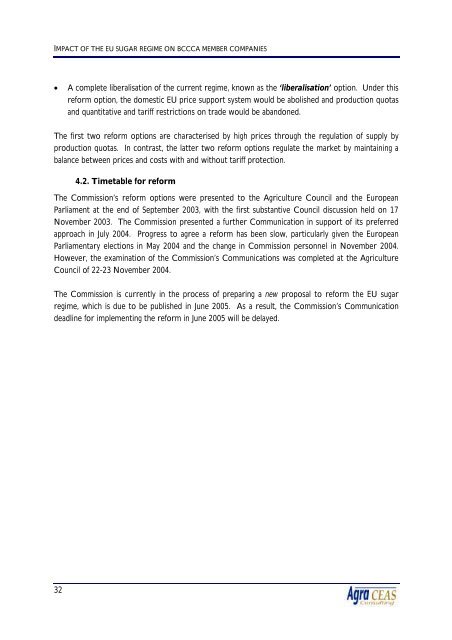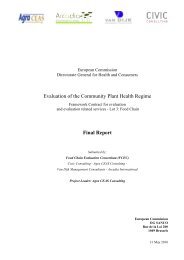2205 final report.pdf - Agra CEAS Consulting
2205 final report.pdf - Agra CEAS Consulting
2205 final report.pdf - Agra CEAS Consulting
You also want an ePaper? Increase the reach of your titles
YUMPU automatically turns print PDFs into web optimized ePapers that Google loves.
IMPACT OF THE EU SUGAR REGIME ON BCCCA MEMBER COMPANIES<br />
• A complete liberalisation of the current regime, known as the ‘liberalisation’ option. Under this<br />
reform option, the domestic EU price support system would be abolished and production quotas<br />
and quantitative and tariff restrictions on trade would be abandoned.<br />
The first two reform options are characterised by high prices through the regulation of supply by<br />
production quotas. In contrast, the latter two reform options regulate the market by maintaining a<br />
balance between prices and costs with and without tariff protection.<br />
4.2. Timetable for reform<br />
The Commission’s reform options were presented to the Agriculture Council and the European<br />
Parliament at the end of September 2003, with the first substantive Council discussion held on 17<br />
November 2003. The Commission presented a further Communication in support of its preferred<br />
approach in July 2004. Progress to agree a reform has been slow, particularly given the European<br />
Parliamentary elections in May 2004 and the change in Commission personnel in November 2004.<br />
However, the examination of the Commission’s Communications was completed at the Agriculture<br />
Council of 22-23 November 2004.<br />
The Commission is currently in the process of preparing a new proposal to reform the EU sugar<br />
regime, which is due to be published in June 2005. As a result, the Commission’s Communication<br />
deadline for implementing the reform in June 2005 will be delayed.<br />
32













